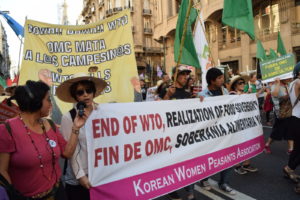The 11th World Trade Organization (WTO) Conference Ministerial Conference held in the city of Buenos Aires left a bitter taste for trade multilateralism. Amid a strong crisis of the organization, the Argentine government insisted on saying “there is life beyond Buenos Aires,” deferring the solution to the crisis. But the truth is that, as expected, nothing important happened at the ministerial conference in Buenos Aires.
However, this conference did have a significant impact on the South American political order. First of all, it was the first WTO Ministerial Conference in South America, a regional context highly favorable to free trade. Since Mauricio Macri took office, the government has promised a massive increase in foreign investment (which has not yet been recorded). This would be accomplished with the “return” to the principle of legal certainty by signing Free Trade Agreements (FTAs) and Investment Agreements that provide certainty for investors. This is the direction taken by the South American trade bloc member countries attempting to join the Pacific Alliance, while different intra-regional FTAs are negotiated in the same direction, such as Chile-Uruguay, Chile-Argentina, Chile-Brazil, South American trade bloc-Mexico, among others.
Secondly, the running of the WTO Conference was used as an excuse for increased militarization in the region. The Argentine government proceeded to buy military equipment to guarantee the security of this conference and the G20 summit in 2018, thereby spending over 150 million dollars in security and organizational expenses. As a result of these meetings, local armed forces will be more technologically advanced and equipped and, once the biennium of meetings and summits is over, they will be available for internal use in a context of increased criminalization of social protest.
Thirdly, this conference was held amid government’s distrust of civil society that has historically followed the ministerial conferences. The creation of a list with more than 60 names of activists whose accreditation, as well as their entry to the country, were denied was an unprecedented event that turned into an international disgrace. This policy of rejection of any kind of civil society participation in the Ministerial Conference revealed a deep lack of knowledge of the way this kind of international organization traditionally works and confirmed the tense internal relationship between the government and social organizations. It should be no surprise that the same strategy is applied to the G20 Summit, with the purpose of keeping everything “under control.”
Therefore, regardless of what happens inside those meetings, the local and regional impact is dramatic, not only on the host country but also on how regional policy is shaped in the coming years.
THE PEOPLES’ SUMMIT: FROM NATIONAL TO GLOBAL
Even though the results of the Ministerial Conference were meagre, there was a clear indication of the resistance against this organization. Wherever WTO as well as G20 conferences and summits are held, social organizations speak out against them and organize themselves to set forth a critical position towards this devious multilateralism.

On occasion of the WTO Conference in Buenos Aires, the Confluence “WTO Out” was organized in Argentina. This confluence was created in mid-2017 and is composed of more than 100 national organizations, plus 100 additional regional and global organizations. “WTO Out” was promoted by the “Argentina better off without FTAs” Assembly1, which works in coordination with regional allies against free trade, particularly the platforms created against the Trans-Pacific Partnership (TPP) in Chile, Mexico and Peru, and also with usual allies such as Red Brasilera contra el Libre Comercio (REBRIP). Different long-standing global resistance organizations have further joined the Confluence “WTO Out”, for example, Red ATTAC, Amigos de la Tierra, La Vía Campesina and CLOC, Latindadd, Global Forest Coalition, Transnational Institute, Global Justice Now, the Committee for the Abolition of Illegitimate Debt (CADTM), DAWN and Jubileo Sur, among others, as well as newly created campaigns such as “Dismantling Corporate Power”.
The “WTO Out” Confluence decided to oppose the Ministerial Conference with street rallies but also with debates on alternatives, holding the flag of the Peoples’ Summit process in Bali in 2013. This does not mean that we disregarded what was happening inside the ministerial conference; however, the decision was to work on alternatives and to criticize the overall trade system. The Peoples’ Summit “WTO Out, Building Sovereignty” was built on this premise, running thematic forums focused on the alternatives to capitalism, sustainable ways of relating to nature, common goods, the model of production and consumption, popular economy and feminist economy2.
Regarding the themes of the Peoples’ Summit, it is important to note that the following two forums stood out: the Forum on Common Goods and the Feminist Forum against Free Trade. During the past decade these two issues have emerged strongly in the trade agenda because they refer directly to the impact of liberalization policies. On one hand, the environmental damage caused by agreements that lead to the reprimarization3 of economies and expand soybean monocultures, deforestation and extractivism while investors enjoy the privilege of suing countries at arbitration tribunals if they oppose this exploitative policy. On the other hand, the emergence of the Feminist Forum in this scenario puts forth a key issue in terms of liberalization and the impact of implementingf these agreements on women’s lives. Currently this impact is embellished in FTAs with the incorporation of chapters on “Women” (e.g. in the Canadian proposal); but in fact they only refer to female entrepreneurs and the economy, without mentioning the overall impact of trade liberalization on women’s lives. These two issues are therefore of utmost importance for the debate on future trade policy in our countries.
The final outcome of the Peoples’ Summit has been more than positive. The organization, coordination and debate process resulted in the political growth of organizations that took on commitments at national and regional level. For many organizations the ministerial conference represented an introduction to the global resistance process. For summit attendees, this introduction entailed a leap in terms of political and human training.
There are several challenges ahead, particularly towards G20 in Buenos Aires, in 2018. Success has been significant but there is still more political work to be done, particularly in terms of coordination between movements. The urgency of change has been replaced by smoke and mirrors of capitalism, with its fake discussions and highly technical debates, filled with data, in different unintelligible languages. Thus it becomes crucial to avoid getting lost in the details. We need to keep focusing on the big picture, on how capitalism works and regularly reshapes. With free trade or with protectionism, the essence is always the same: labor exploitation and plundering of the planet. The Peoples’ Summits process focused on the debate of alternatives therefore becomes increasingly necessary.

NOTES
2 https://fueraomc.org/final-statement/
3 Reprimarization refers to the return to primary commodities, such as mining, oil, cattle, and soybean, as the main source of export revenues; a tendency seen in many countries of Latin America in recent decades.
This article is published in the DAWN Informs July 2018.
